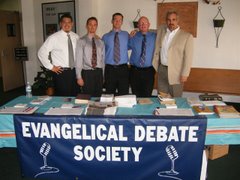Part 1.
"So we are always confident, knowing that while we are at home in the body we are absent from the Lord. For we walk by faith, not by sight. We are confident, yes, well pleased rather to be absent from the body and to be present with the Lord."
(2 Corinthians 5:6-8)
"For to me, to live is Christ and to die is gain. If I am to go on living in the body, this will mean fruitful labor for me. Yet what shall I choose? I do not know! I am torn between the two: I desire to depart and be with Christ, which is better by far; but it is more necessary for you that I remain in the body" (Philippians 1:21-24).
"While they were stoning him, Stephen prayed, "Lord Jesus, receive my spirit." Then he fell on his knees and cried out, "Lord, do not hold this sin against them." When he had said this, he fell asleep" (Acts 7:59-60).
Well, it is interesting what things strike a cord with the readers of my blogs and essay's. My recent work entitled, "Is the Seventh Day Adventist Church a Cult?" even drew Nathan Hitchcock, my old "Cross Talk" co-host on Biola's KBBK's radio station into the fray, as well as Biblical Unitarian Patrick Navas. These fine gentlemen and others have asked me essentially, what is so "pernicious" about the doctrine of "Soul Sleep" espoused by Seventh Day Adventists, Jehovah's Witnesses, Christadelphians and other abberant religious groups.
The doctrine of Soul Sleep or unconscious temporal mortality essentially postulates the wayward thesis that human beings do not possess immortal souls, rather their souls are their physical existence and when the body dies, the soul goes to the grave to wait the resurrection. Some heretical cults such as the Jehovah's Witnesses and the Christadelphians teach, the soul goes to the grave, subsequently those who are righteous are risen at the resurrection and those who are evil are anniliated.
For the sake of time, I will limit the scope of this response essay to the doctrine of "Soul Sleep" exclusively and exclude the additional conception of annilationism, since not all advocates of "Soul Sleep" necessarily espouse the doctrine that the soul of the wicked is annilated at the resurrection. If time and interest arises for me to take on the issue of annilationism, I shall.
Now, the doctrine of Soul Sleep is "pernicious" or destructive because it is contrary to the Bible's explicit teaching that, "to be absent from the body is to be present with the Lord", that is, the Bible clearly teaches that the soul of a Christian immediately goes to heaven to be with Christ. Thus, the souls of redeemed people immediately are with Jesus Christ in heaven and are not "sleeping" or in a state of unconsciousness. Paul said to be "absent from the body is to be present with the Lord" and that he had a "desire to depart to be with Christ." Yet, the main argument for those who promote soul-sleep are these: the word sleeping is for those who die, that it is unconsciousness (1 Thess.4:13-14, 1 Cor. 15:20,51).
In the days ahead, I will further develop my thoughts on "soul sleep" I am in Hawaii, so be patient with me, I'll get to this little by little until I develop a full essay on the immortality of the soul.
Defending the Historic Evangelical Christian Faith in our postmodern and post-Christian times for the glory of Almighty God and the salvation of all peoples. We believe in the Trinity, the authority of the Bible alone, salvation is by grace alone through faith alone in Jesus Christ alone, based on the Bible alone for the glory of Almighty God alone, amen. Evangelical Debate Society Website: http://www.evdebate.com/
The Evangelical Debate Society

About Me
- The Evangelical Debate Society
- Lee Edward Enochs Chairman, The Evangelical Debate Society We are a Conservative, Bible based and Christ centered Evangelical Apologetics ministry dedicated to the defense of Evangelical Christianity and the promotion of the Gospel of Jesus Christ. We believe in the absolute and exclusive authority, inerrancy, infallibility and inspiration of the Bible in every respect and in all its parts. We believe the Bible is our only authority in all matters pertaining to Christian faith and practice including Christian Apologetics and debating. We believe in the doctrine of the Trinity, the full Deity of Jesus Christ, His virgin birth, sinless life and substitutionary atonement on the Cross of Calvary. We believe in the Protestant Reformation doctrine of justification by grace alone through faith alone in Jesus Christ alone based on the exclusive authority of the Bible alone all for the glory of God. We defend the Evangelical Christian faith likewise, all for the glory of God and believe that all men and women should repent of their sins and place their faith in Jesus Christ.